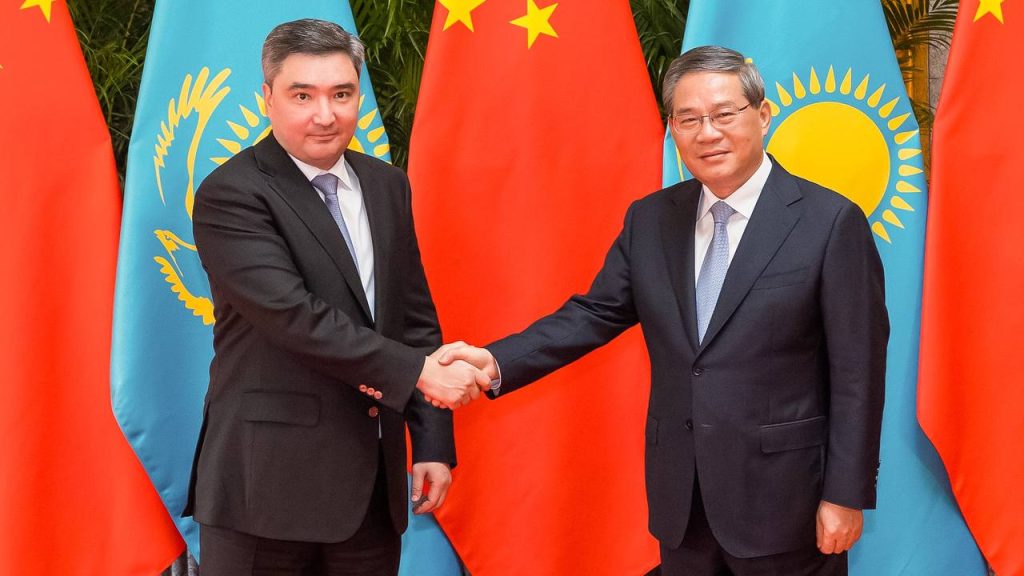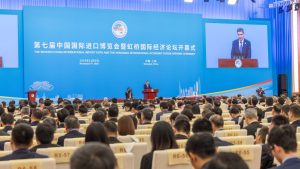
During his working visit to the People’s Republic of China, Kazakhstan’s Prime Minister Olzhas Bektenov conducted a series of strategically important events aimed at enhancing trade and economic cooperation between Kazakhstan and China. In Shanghai, he met with prominent representatives of Chinese business, participated in the 7th China International Import Expo, and held discussions with China’s Premier of the State Council, Li Qiang.
At the Kazakhstan-China Investment Roundtable, attended by over 100 representatives from major Chinese companies, discussions covered promising avenues for investment and expanding cooperation. Agreements signed at the event attracted approximately $25 billion in investments across key sectors such as energy, transport and logistics, agriculture, and high technology. This event marked a significant step in strengthening economic interaction and increasing Chinese capital presence in Kazakhstan’s projects, aligning with Kazakhstan’s strategic priorities of attracting direct foreign investment.
Prime Minister Bektenov’s meeting with China’s Premier Li Qiang focused on deepening trade and economic cooperation between Kazakhstan and China, in line with objectives set by the leaders of both nations. During this meeting, special attention was given to enhancing collaboration in areas such as trade, investment, transport and logistics, agriculture, energy, tourism, and expanding cultural and humanitarian exchanges.
The discussions with Li Qiang emphasized the need for further development of trade relations and logistical connectivity. Kazakhstan remains a vital link in the transit of goods between China and Europe. The leaders discussed opportunities to expand trade and investment flows, highlighting the importance of the “Belt and Road Initiative” and the strategic partnership between the countries. Kazakhstan sees significant potential for regional cooperation through the development of transport corridors, such as the Trans-Caspian International Transport Route.
Both sides expressed a positive outlook on the current trajectory of Kazakhstan-China cooperation, noting that bilateral trade for the first nine months of the current year reached $33 billion. Kazakhstan places special importance on its partnership with China, its largest trading partner. According to Bektenov, the recent state visit by Chinese President Xi Jinping to Kazakhstan provided fresh momentum for developing this partnership within the “Golden 30 Years” framework. Emphasizing Kazakhstan’s commitment to increasing trade turnover, the government aims for full-scale, mutually beneficial cooperation with China.
Bektenov also noted Kazakhstan’s focus on expanding and optimizing trade structure, particularly through high-value-added products. Discussions included 180 product categories worth $1.6 billion, with potential to increase exports in metallurgy, petrochemicals, food, machinery, and construction materials. An essential element of the partnership is Kazakhstan’s agricultural products, which have a consistently high demand in China. In the past nine months, trade in the agricultural sector increased by 5.8%, demonstrating Chinese consumers’ interest in Kazakhstan’s eco-friendly products. The parties discussed expanding exports of Kazakh grain, crop and livestock products, as well as accrediting new Kazakh enterprises for exports to the Chinese market.
Further cooperation in the transport and logistics sectors was also discussed. Currently, more than 80% of China-Europe land shipments pass through Kazakhstan, underscoring Kazakhstan’s pivotal role in the “Belt and Road Initiative.” Bektenov highlighted the potential of the Trans-Caspian International Transport Route project, which could further unlock the potential of the “North-South” and “East-West” corridors. In the first nine months of this year, freight volumes along the Middle Corridor rose by 23% compared to the previous year, reaching 3.4 million tons. By 2030, freight volume is expected to reach 10 million tons annually.
Kazakhstan has made significant advances in container shipping. The opening of a logistics center in Xi’an has increased transit shipments along the “China-Europe-China” route by 24 times, reaching 24,000 TEUs. In October, construction began on a container hub at the port of Aktau in partnership with the company “Port of Lianyungang,” which will increase container handling capacity to 300,000 TEUs per year. Additionally, the parties discussed accelerating customs procedures to manage a 60% increase in road transport. Work is also underway to open new checkpoints in Almaty and East Kazakhstan regions.
Premier Li Qiang reaffirmed China’s commitment to deepening its strategic partnership with Kazakhstan. Li Qiang emphasized the long-standing friendly relations, the shared 1,700-kilometer border, and the achievements in diplomatic relations over the past 30 years. Under the guidance of the two nations’ leaders, relations between Kazakhstan and China have reached a high level of stable and comprehensive partnership.
At the conclusion of the negotiations, both sides confirmed their intention to continue developing investment and trade-economic cooperation. A series of documents formalizing agreements between the two countries were signed following the meeting.
Additionally, Bektenov’s participation in the opening of the 7th China International Import Expo highlighted Kazakhstan’s interest in promoting national products in the Chinese market and strengthening bilateral trade. The expo showcased products from Kazakh producers, including those in the agricultural and processing sectors, which cater to the demand from Chinese consumers, contributing to export growth and further strengthening economic ties.

Prime Minister Olzhas Bektenov’s visit to China and his participation in key events in Shanghai have created new opportunities for Kazakhstan’s economy and bilateral relations with China. The meetings and agreements reached have the potential to yield significant benefits for Kazakhstan in both the economic and political spheres.
The agreements signed, totaling approximately $25 billion, will stimulate direct investment in key sectors of Kazakhstan’s economy. These funds are directed toward the development of energy, agriculture, transport, logistics, and high technology. The capital inflow into these sectors provides not only financial support but also the adoption of modern technologies and management practices, enhancing the competitiveness of Kazakh enterprises and boosting productivity. Infrastructure development, particularly in transport and logistics, will increase trade turnover, which in turn will drive GDP growth and create new jobs.
Kazakhstan’s active participation in the China International Import Expo in Shanghai strengthens the position of Kazakh products in the Chinese market. Showcasing national products, particularly agricultural and processed goods, confirms the demand for Kazakhstan’s eco-friendly goods in China. This opens up opportunities to increase exports, which will help diversify Kazakhstan’s economy and reduce reliance on hydrocarbon exports. Additionally, the accreditation of new Kazakh enterprises to supply the Chinese market will expand the product range available to Chinese consumers, creating a stable market for Kazakh producers.
Kazakhstan plays a crucial role in the international “Belt and Road” initiative, and the Prime Minister’s visit highlighted the country’s importance as a transit corridor between Asia and Europe. Joint projects, such as the Trans-Caspian International Transport Route, will increase the capacity of the “North-South” and “East-West” transport corridors. Growth in container shipments and the construction of a logistics hub in Aktau will also improve the efficiency and volume of transit through Kazakhstan. By 2030, freight volume is expected to reach 10 million tons per year, contributing to income diversification and strengthening Kazakhstan’s position as a key logistics partner for China.
The visit reinforces the political partnership between Kazakhstan and China. China regards Kazakhstan as an essential strategic partner in Central Asia, and regular high-level meetings deepen diplomatic and economic ties. Leaders from both countries emphasize the importance of long-term cooperation based on mutual respect and stability. For Kazakhstan, this means an opportunity not only to strengthen bilateral relations but also to receive steady support from China on international issues, thereby enhancing the country’s political standing on the global stage.
The development of infrastructure projects involving Chinese investment can positively impact Kazakhstan’s sustainable development. Implementing environmentally friendly and energy-efficient technologies in these projects typically helps reduce the carbon footprint and enhance environmental safety. Given global trends toward a green economy, this cooperation with China could support Kazakhstan’s sustainable development strategy and improve the country’s environmental conditions.
Conclusion
Bektenov’s visit and the agreements reached during the meetings in Shanghai strengthen Kazakhstan’s economic and political standing as an important partner of China in the region. Investments, infrastructure development, increased trade turnover, and strengthened bilateral relations will lead to positive economic changes and create new opportunities for Kazakhstan. This also enhances the country’s resilience to external economic challenges, supports diversification, improves the quality and security of logistics networks, and helps solidify Kazakhstan’s role as a key participant in international trade and economic routes.
China Studies Center, Astana
